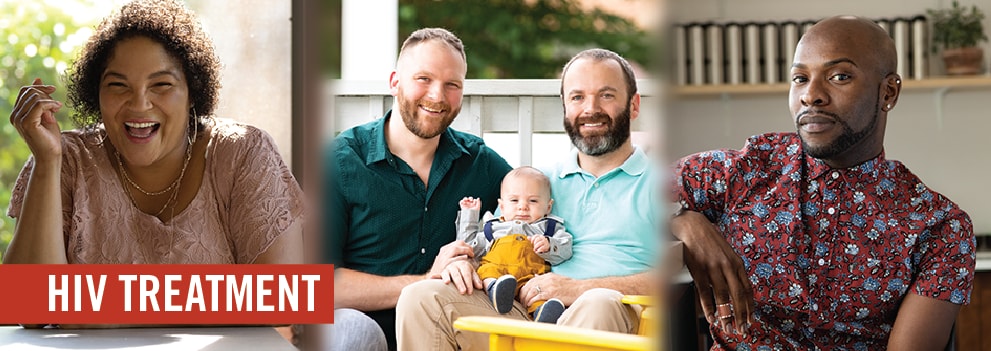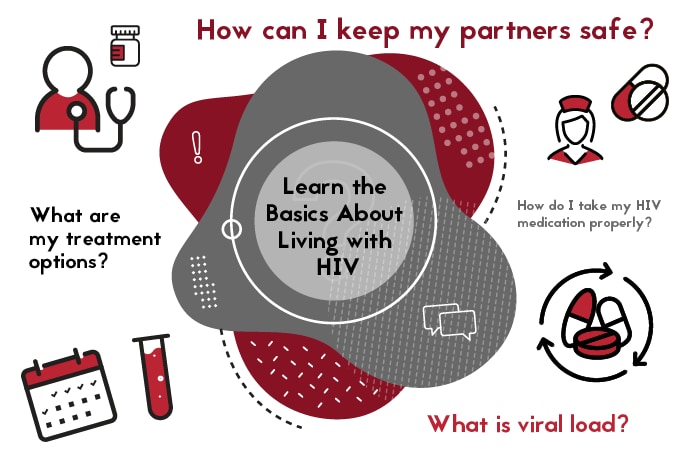HIV Treatment

Get in Care
Starting HIV treatment early keeps you healthy. If you need help finding an HIV care provider near you, visit locator.hiv.gov.
Stay in Care
Treatment works best when you commit to sticking to your treatment schedule and doctor appointments. There are many HIV treatments available. Your doctor can help you find the right one for you.
Live Well
Healthy eating and exercising offer benefits that can help you maintain good physical and mental health. Also, this will help your immune system fight off infections so you can live your best life.
Become Undetectable
Taking your medication as prescribed and keeping an undetectable viral load are the best things you can do to stay healthy, and doing so also prevents you from sexually transmitting HIV to your HIV-negative partner.
What is HIV treatment?
- There is no cure for HIV, but you can control it with HIV treatment.
- Most people can get the virus under control within six months.
- HIV treatment does not prevent transmission of other sexually transmitted diseases.
- All people with HIV should take HIV treatment, no matter how long they’ve had HIV or how healthy they are.
- Talk to your health care provider about any medical conditions or other medicines you are taking.
If you delay treatment, HIV will continue to harm your immune system. Delaying treatment will put you at higher risk for transmitting HIV to your partners, getting sick, and developing AIDS.
There are two types of HIV treatment: pills and shots.
- Pills are recommended for people who are just starting HIV treatment. There are many FDA-approved single pill and combination medicines available.
- People who have had an undetectable viral load (or have been virally suppressed) for at least three months may consider shots.
HIV treatment shots are long-acting injections used to treat people with HIV. The shots are given by your health care provider and require routine office visits. HIV treatment shots are given once a month or once every other month, depending on your treatment plan.
Talk to your health care provider about changing your HIV treatment plan. Shots may be right for you if you are an adult with HIV who
- has an undetectable viral load (or has achieved viral suppression),
- has no history of treatment failure, and
- has no known allergy to the medicines in the shot.
If you and your health care provider decide to switch your HIV treatment from pills to shots, you’ll need to visit your provider regularly to receive your shots. Tell your health care provider as soon as possible if you’ve missed or plan to miss an appointment for your shot.
HIV treatment reduces the amount of HIV in the blood (viral load).
- Taking your HIV medicine as prescribed will help keep your viral load low.
- HIV treatment can make the viral load very low (viral suppression). Viral suppression means having less than 200 copies of HIV per milliliter of blood.
- HIV treatment can make the viral load so low that a test can’t detect it (undetectable viral load).
- If your viral load goes down after starting HIV treatment, that means treatment is working. Continue to take your HIV treatment as prescribed.
- If you skip your HIV treatment, even now and then, you are giving HIV the chance to multiply rapidly. This could weaken your immune system, and you could become sick.
- Getting and keeping an undetectable viral load (or staying virally suppressed) is the best way to stay healthy and protect others.
HIV treatment prevents transmission to others.
- If you have an undetectable viral load, you will not transmit HIV through sex. This is also known as Undetectable = Untransmittable.
- Having an undetectable viral load likely reduces the risk of HIV transmission through sharing needles, syringes, or other injection equipment (for example, cookers), but we don’t know by how much.
- Having an undetectable viral load also prevents perinatal transmission. If a person with HIV takes their HIV medicine as prescribed throughout pregnancy and childbirth and gives HIV treatment to their baby for 4 to 6 weeks after birth, the risk of transmission can be 1% or less.
- Having an undetectable viral load greatly reduces the risk of transmitting HIV through breastfeeding but doesn’t eliminate the risk. The current recommendation in the United States is that parents with HIV should not breastfeed their babies.
Taking your HIV medicine as prescribed helps prevent drug resistance.
- Drug resistance develops when people with HIV don’t take their pills as prescribed or miss their shots. The virus can change (mutate) and may limit your options for successful HIV treatment.
- If you develop drug resistance, it will limit your options for successful HIV treatment.
- Drug-resistant strains of HIV can be transmitted to others.
HIV treatment can cause side effects in some people. However, not everyone experiences side effects. The most common side effects are
- Nausea and vomiting
- Diarrhea
- Difficulty sleeping
- Dry mouth
- Headache
- Rash
- Dizziness
- Fatigue
- Temporary pain at the injection site (for shots)
Talk to your health care provider if your HIV treatment makes you sick. Your health care provider may prescribe additional medicines to help manage the side effects or may change your HIV treatment plan.
- Your health care provider may change your type of HIV treatment.
- A change is not unusual because the same HIV treatment does not affect everyone in the same way.
Tell your health care provider right away if you’re having trouble sticking to your plan. Together you can identify the reasons you’re skipping HIV treatment and decide how to address those reasons.
Talk to your health care provider about problems taking your HIV treatment.
- Problems taking pills. This can make staying on this type of HIV treatment challenging. Your health care provider can offer tips for addressing these problems, including switching to an injectable HIV treatment option.
- Side effects. Nausea or diarrhea can make a person not want to continue their HIV treatment. There are medicines or other support, like nutritional counseling, to make sure you’re getting important nutrients. This can help with the most common side effects.
- HIV treatment fatigue. Some people find that sticking to their HIV treatment plan becomes harder over time. Make it a point to talk to your health care provider about staying on your plan.
- A busy schedule. Work or travel away from home can make it easy to forget to take pills or miss a shot. It may be possible to keep extra pills at work or in your car. But talk to your health care provider first as extreme temperatures can affect some medicine.
Talk to your health care provider if you miss doses of your HIV treatment.
- Missing a dose of pills. In most cases, you can take your pills as soon as you realize you missed a dose. Then take the next dose at your usually scheduled time (unless your pharmacist or health care provider has told you otherwise).
- Missing a shot. If you missed an appointment for your shot, talk to your health care provider about receiving your next shot.
- Missing doses. Talk to your health care provider or pharmacist about ways to help you remember your HIV treatment. Your health care provider may even decide to change your treatment to fit your needs and life situation.
Find help for mental health or substance use disorders.
- Being sick or depressed. How you feel mentally and physically can affect your ability to stick to your HIV treatment plan. Your health care provider, social worker, or case manager can refer you to a mental health provider or local support group.
- Substance use (drug or alcohol). If substance use is interfering with your ability to keep yourself healthy, it may be time to find help.
- If you need help finding substance use disorder treatment or mental health services, use SAMHSA’s Treatment Locator.
Join a support group or ask your family and friends for support. They can help you stick to your treatment plan.
Learn more about living with HIV.

